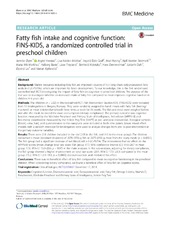| dc.contributor.author | Øyen, Jannike | |
| dc.contributor.author | Kvestad, Ingrid | |
| dc.contributor.author | Midtbø, Lisa Kolden | |
| dc.contributor.author | Graff, Ingvild Eide | |
| dc.contributor.author | Hysing, Mari | |
| dc.contributor.author | Stormark, Kjell Morten | |
| dc.contributor.author | Wik, Maria | |
| dc.contributor.author | Baste, Valborg | |
| dc.contributor.author | Frøyland, Livar | |
| dc.contributor.author | Koletzko, Berthold | |
| dc.contributor.author | Demmelmair, Hans | |
| dc.contributor.author | Dahl, Lisbeth | |
| dc.contributor.author | Lie, Øyvind | |
| dc.contributor.author | Kjellevold, Marian | |
| dc.date.accessioned | 2019-02-18T17:26:04Z | |
| dc.date.available | 2019-02-18T17:26:04Z | |
| dc.date.issued | 2018-03-12 | |
| dc.Published | Øyen J, Kvestad I, Midtbø LK, Graff IE, Hysing M, Stormark KM, Wik M, Baste V, Frøyland L, Koletzko B, Demmelmair, Dahl L, Lie Ø, Kjellevold MK. Fatty fish intake and cognitive function: FINS-KIDS, a randomized controlled trial in preschool children. BMC Medicine. 2018;16:41 | eng |
| dc.identifier.issn | 1741-7015 | |
| dc.identifier.uri | https://hdl.handle.net/1956/19110 | |
| dc.description.abstract | Background: Marine resources including fatty fish are important sources of n-3 long chain polyunsaturated fatty acids (n-3 LC-PUFAs), which are important for brain development. To our knowledge, this is the first randomized controlled trial (RCT) investigating the impact of fatty fish on cognition in preschool children. The purpose of the trial was to investigate whether an increased intake of fatty fish compared to meat improves cognitive function in children 4–6 years old. Methods: The children (n = 232) in this two-armed RCT, Fish Intervention Studies-KIDS (FINS-KIDS) were recruited from 13 kindergartens in Bergen, Norway. They were randomly assigned to lunch meals with fatty fish (herring/mackerel) or meat (chicken/lamb/beef) three times a week for 16 weeks. The fish and meat were weighed before and after the meals to record the exact consumption (dietary compliance). The primary outcome was cognitive function measured by the Wechsler Preschool and Primary Scale of Intelligence, 3rd edition (WPPSI-III) and fine-motor coordination measured by the 9-Hole Peg Test (9-HPT) at pre- and post-intervention. Biological samples (blood, urine, hair), and questionnaires to the caregivers were included at both time points. Linear mixed effect models with a random intercept for kindergarten were used to analyze changes from pre- to post-intervention in the primary outcome variables. Results: There were 218 children included in the trial (105 in the fish, and 113 in the meat group). The children consumed a mean (standard deviation) of 2070 (978) g fish or 2675 (850) g meat from the study meals (p < 0.0001). The fish group had a significant increase of red blood cell n-3 LC-PUFAs. The intervention had no effect on the WPPSI-III scores (mean change total raw score; fish group 17.7, 95% confidence interval (CI) 14.8–20.7 vs meat group 17.8, 95% CI 15.0–20.6, p = 0.97) in the main analyses. In the sub-analyses, adjusting for dietary compliance, the fish group showed a higher improvement on total raw score (20.4, 95% CI 17.5–23.3) compared to the meat group (15.2, 95% CI 12.4–18.0, p = 0.0060); docosahexaenoic acid mediated this effect. Conclusions: There was no beneficial effect of fatty fish compared to meat on cognitive functioning in the preschool children. When considering dietary compliance, we found a beneficial effect of fatty fish on cognitive scores. | en_US |
| dc.language.iso | eng | eng |
| dc.publisher | BioMed Central | eng |
| dc.rights | Attribution CC BY | eng |
| dc.rights.uri | http://creativecommons.org/licenses/by/4.0/ | eng |
| dc.subject | Cognitive function | eng |
| dc.subject | Docosahexaenoic acid | eng |
| dc.subject | Eicosapentaenoic acid | eng |
| dc.subject | Fatty fish | eng |
| dc.subject | Omega-3 index | eng |
| dc.subject | Vitamin D | eng |
| dc.subject | Preschoolers | eng |
| dc.subject | Wechsler Preschool and Primary Scale of Intelligence | eng |
| dc.subject | 9-Hole Peg Test | eng |
| dc.title | Fatty fish intake and cognitive function: FINS-KIDS, a randomized controlled trial in preschool children | eng |
| dc.type | Peer reviewed | |
| dc.type | Journal article | |
| dc.date.updated | 2018-09-04T08:13:18Z | |
| dc.description.version | publishedVersion | |
| dc.rights.holder | Copyright 2018 The Authors | eng |
| dc.identifier.doi | https://doi.org/10.1186/s12916-018-1020-z | |
| dc.identifier.cristin | 1576715 | |
| dc.source.journal | BMC Medicine | |
| dc.relation.project | Norges forskningsråd: 222648 | |

